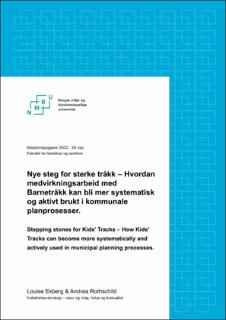Nye steg for sterke tråkk : hvordan kan medvirkningsarbeid med Barnetråkk bli mer systematisk og aktivt brukt i kommunale planprosesser
Master thesis

View/
Date
2022Metadata
Show full item recordCollections
- Master’s theses (LandSam) [1033]
Abstract
Bakgrunn: Ung medvirkning i kommunale planprosesser kan gi barn og unge en arena for å utøve deres lovpålagte rettighet til å bli hørt i saker som omhandler dem. Ved at det tilrettelegges for at medvirkningen er meningsfull for de involverte, kan deres mestringstro, stedstilhørighet, kunnskap og ferdigheter potensielt styrkes. Foruten folkehelsefordelene ung medvirkning kan ha på individnivå, kan det også bidra til kvalitetssikring av kommunale plansaker. Et verktøy for å involvere barn og unge i medvirkning i kommunale planprosesser er Barnetråkk. Barnetråkk gir barn og unge mulighet til å fortelle kommunale aktører om hvordan de bruker sitt nærmiljø. Det er derimot manglende systematisk kunnskap om medvirkningsmetoder i kommunale planprosesser, samt at Barnetråkk ikke blir brukt i stor nok grad. Derfor ønsker vi å undersøke hva kommunale aktører i bydel Grünerløkka behøver for å aktivt benytte Barnetråkk i kommunale planprosesser.
Metode: Studien bruker triangulering av metodene observasjon, semistrukturert gruppeintervju og concept mapping. Observasjon og semistrukturert gruppeintervju er av kvalitativt design. Concept mapping er en integrert mixed method, hvilket inneholder både kvalitative og kvantiative komponenter. Observasjonen ble gjennomført ved en Barnetråkk-registrering ved Sinsen skole. Semistrukturert gruppeintervju ble gjennomført med tre skoleansatte ved Sinsen skole, med hensikt om å kartlegge deres erfaringer, perspektiver og opplevelser rundt Barnetråkk-registreringen. Det inkluderte tre gruppesesjoner for å generere utsagn med hensikt om å besvare problemstillingen. De tre gruppene inkluderte totalt 13 kommunale aktører.
Hovedfunn: Det ble funnet at kommunale aktører behøver god arbeidsstruktur, god kommunikasjon, sterke insentiver, teknisk fungerende Barnetråkk-verktøy og valide data for å gjennomføre registreringer og bruke resultatene fra Barnetråkk. For at Barnetråkk skal oppnå de potensielle folkehelsefordelene som følger med aktiv medvirkning er det nødvendig at elevene gis reell påvirkningskraft i relasjon til Barnetråkk-registreringene, og at det legges til rette for elevenes utvikling og læring. Dette kunne potensielt oppnås dersom skolene ble gitt ferdige undervisningsopplegg i forkant av registreringer som tilrettelegger for aktiv medvirkning. Tilbakemelding til skoler og elever ble fremhevet som viktig for å redusere medvirkningstretthet og øke elevenes tillit til det politiske systemet. Aktørene mente at registreringer med mindre grupper, dialog med elevene og skrive notater underveis, samt gjennomgang av resultatene med elevene potensielt kunne styrke validiteten til resultatene. Background: Youth participation in municipal planning processes can provide children and youths with a platform for exercising their statutory right to have their voice heard in matters that concern them. By ensuring that youth participation in the municipal planning process is meaningful, self-efficacy, place attachment, knowledge and skills can be enhanced. In addition to the public health benefits youth participation can have on the individual level; it can also have a positive impact on quality assurance during the municipality planning process. One tool for enabling youth participation in municipal planning processes is Kids' Tracks. Kids' Tracks enables children and youths to be involved in the stakeholder engagement process of the municipality and can provide greater insight into how this demographic use their local environment. However, there is a lack of systematic knowledge regarding how to best use participation methods within the municipalities, which contributes to the underutilization of Kids' Tracks within planning processes. Consequently, the purpose of this study is to investigate how municipal stakeholders within bydel Grünerløkka can utilize Kids' Tracks more actively in municipal planning processes.
Method: The study collected data using a triangulation of methods; observation, semistructured group interview and concept mapping. Observation and semi-structured group interviews are of qualitative design. Concept mapping is an integrated mixed method, which contains both qualitative and quantitative components. The observation was performed during a Kids' Tracks -registration at Sinsen School. A semi-structured group interview was conducted with three school employees at Sinsen school with the intention of mapping their experiences, perspectives, and experiences around the Kids' Tracks registration. It included three group sessions to generate statements with the intention of answering the research aim. The three groups included a total of 13 municipality stakeholders.
Main findings: It was found that the usability of the results and validity of registration data from Kids' Tracks was dependent on the technical functionality of the Kids' Tracks tool, quality of work structure, efficacy of communication and how participation was incentivized. To enable Kids' Tracks to achieve the potential public health benefits that come with active participation, it is necessary that the pupils are given tangible influence in relation to the Kids' Tracks registrations, and that the pupils' development and learning is facilitated. This could potentially be achieved by providing teachers with readymade teaching material in advance of registrations that would facilitate active participation. Feedback to schools and students was emphasized as important in reducing participatory fatigue and increasing students' confidence in the municipality systems. The stakeholders believed the validity of results could potentially be strengthened by conducting registrations with smaller groups, increasing dialogue with the students, encouraging note taking throughout Kids' Tracks teaching sessions and conducting feedback sessions where results are reviewed with the students.
